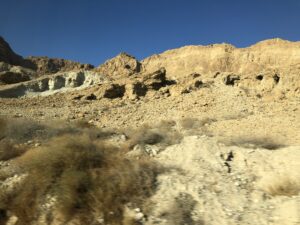
Yitro, this week’s Torah reading, is famous for containing the Aseret haDibrot, commonly translated as “The Ten Commandments.” There’s no question that a law code is necessary for a community to be cohesive, to have a set of principles to guide them, and to create a vehicle for those living in that community to get along. Interestingly, None of the commandments listed in this recitation contains a consequence for violating them; the only thing that comes close is the commandment to not bow down to other gods, or Adonai our God will keep in mind the sin of the parents for future generations. Not exactly compelling–When parents behave badly, children suffer.
Rules and Laws are all well and good, but there’s no point in making them if they can’t be enforced and understood. The Torah brilliantly opens parashat Yitro by (sort of) reuniting Moses with his family, brought to him by his father-in-law, Yitro. I say “sort of,” because the text never tells us that Moses reunited with Tzippora, his wife, and his sons, Gershom and Eliezer, just Yitro!
Of course, no story can focus on too many plot lines at once, and being a product of its time, the Torah tends to focus on the men. This time is no exception. The men sit down to a meal and Moses recounts all of the things that the Holy Blessed One had done for the Israelites; freeing them from slavery in Egypt, bringing them through the Sea of Reeds, and providing food and water.
Until now, we have no idea of what Moses has been doing all day, other than talking with God and the people, and leading the march. In Exodus 18:30 we learn, “Moses sat as magistrate among the people, while the people stood about Moses from morning until evening.” Yitro, with many more years under his belt, and presumably the knowledge and wisdom to go with it, offers some advice. He reminds Moses that he’ll wear himself out if he continues along this path, and advises him to appoint elders and men of good reputation to serve as judges for the smaller disputes, and only the most difficult cases would make their way to Moses. (Ex. 18:17-23).
Moses take his advice, and creates a system that endures to this day, just think about the US Court system! Only then can the Divine Judge begin to list the laws, rules, precepts and statutes that will guide the fledgling nation as it prepares to enter the Promised Land.









0 Comments